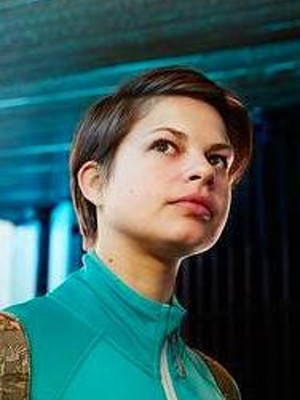Women in Data Science: mentoring and applying app-based and sensing methods to cognitive and decision sciences
Women in Data Science: mentoring and applying app-based and sensing methods to cognitive and decision sciences
Posted on 13 August 2019
Women in Data Science: mentoring and applying app-based and sensing methods to cognitive and decision sciences
 Image by Michael Schwarzenberger
Image by Michael SchwarzenbergerBy Reka Solymosi, Software Sustainability Institute Fellow.
From 4 – 5 April 2019, I attended the Women in Data Science Zurich 2019 conference as an invited speaker to talk about my research involving ‘new’ forms of data. In particular the use of crowdsourced data collection methods to gain insight into people’s perceptions and subjective evaluations of their environments. I have made my slides from the talk available on slideshare. Since I was already in Switzerland, I was also asked to give this presentation at the University of Basel for the Cognitive and Decision Sciences Research Group in the Faculty of Psychology.
Attending the Women in Data Science conference was a nice change from the usual academic, domain specific conferences. While I usually feel self conscious at these events, I was invited because of a talk I gave elsewhere, so I had some faith that my talk would be on-topic enough to be relevant to the audiences. The attendees were about 2/3 from industry and 1/3 from academia. The format of the conference was made up of traditional presentations with a mix of activities. One of the activities that I want to pick out in particular is the mentoring sessions.
Mentoring has valuable impact on people’s career progressions in both academia and industry. Mentoring can facilitate positive socialisation among women to STEM fields by encouraging interaction with successful individuals and by providing career and psychosocial (i.e., combining aspects of psychological and social behaviors) support. So fostering the development of such mentoring relationships has implications for promoting diversity in the field of data science. Mentoring is one of the key ways to increase diversity. In particular, it can be hard for women in male-dominated fields like data science to find mentorship. “While finding a mentor can be a challenge, for women the challenge is intensified in this male-dominated industry.” The mentoring sessions at WiDS were set up to make this easier. The way this was set up in practice was that all invited speakers were asked to choose from a list of topics on which they would be happy to mentor. I chose the “academia vs. industry” topic. As an academic in a permanent position, and as someone who had spent (a short) time working in public sector outside of academia after my PhD, I thought that I could share my experience and possibly provide some words of wisdom to those willing to listen. However I found it very tough to try to give credible advice. I decided to take an approach where I was upfront about the fact that my experience might not reflect that of others (it may be domain-specific), and that I had no private sector industry experience at all. Despite my fear of lack of credibility, the sessions went really smoothly. I managed to turn the sessions into discussions, where those who came to my table discussed their experiences, the advice they had received with elsewhere, and then I shared my experience and together we reflected on how that may converge (or not) with how I chose academia.
Overall the discussions were incredibly interesting and valuable (at least for me, but I hope also for those who came to my table expecting to be mentored). I had some lovely feedback on twitter:
Had the most wonderful time chatting with @r_solymosi during the mentorship sesh at #WIDSZurich2019 about research in academia and industry, on the interface and about all the cool work she’s doing in social data Science and crime studies!
— Akriti @ GHC’19 (@akriticodes) April 4, 2019But also I had a key takeaway message that I can take on mentorship roles. As an early career academic I have not really considered this. I have of course taken up leadership roles as Principal Investigator on now three grants, two with research assistants directly line managed by myself. Further I have supervision duties for PhD students as well. And in these roles I take care to consider the development of my RAs/PhD students, and make sure that they learn and benefit as well as get paid, and hope to make clear to them that they can come to me for questions. But I never really considered that I could act as mentor. After this experience I will try to take this more explicitly on myself to play such a role for more junior colleagues, students, and whoever might benefit.
The talks themselves were also very interesting of course. Many were quite technical, but none were too difficult to follow, even for myself with no mathematical background. It was very interesting to see the wide range of applications of data science to practice and industry in various sectors.
The conference also had a networking event at Google on the first night. This was a great opportunity to speak informally with the attendees and other presenters. The atmosphere was very welcoming and friendly, and I have to say it was one of the easiest conferences for meeting people that I have ever attended. Participants were genuinely curious in one another’s work, experience, and general data science interests. Besides that, this was also a very international meeting, with people representing various countries across the globe.
Making new friends at #WiDSZurich2019 and learning so much about food, hair, and of course data science ? https://t.co/FBE3GiuIkh
— reka s (@r_solymosi) April 5, 2019After this conference was over, I made a visit to the University of Basel, to present the same topic to the research group of Cognitive and Decision Sciences Research Group in the Faculty of Psychology. Their primary focus is something that is quite different than my own substantive topic – but currently they are interested in people’s risk perceptions, and making use of ecological momentary assessment methodology to measure this phenomena. This is something which I developed for my PhD research in order to measure people’s perception of crime risk and risky places. In particular I built a mobile application to collect spatially and temporally explicit data about how safe people felt during their everyday routine activities. I built the tool myself, and made it available on GitHub for anyone else interested in this. I have also since then co-delivered a webinar about app-based research methods for social sciences with a colleague from Australia who is also working on similar topics.
This presentation was specifically rewarding for me as this is a recognition of the software development and technological and methodological innovation which formed a large part of my PhD research, although it is not specifically recognised as a contribution in my field traditionally. I felt proud to be able to promote this work, and to further spread awareness of such approaches and increase the value of this work in the social sciences more widely, and consider further applications of the tool and method. I hope to keep in touch with members of this research team and to be able to collaborate in the future.
Overall, this journey was a great step outside of my comfort zone of the usual academic conference. It also marks the last of my Software Sustainability Institute Fellowship funded events. I have to say that all the events that I attended through the Fellowship funding took me out of my comfort zone in some way (e.g. TicTec for civic technology enthusiasts, or organising #rstats events for all disciplines). Mostly, I gained an opportunity to focus on this technical and methodological angle of my research interests, rather than the traditional, domain-based approach. I also got to meet and work with people that I otherwise may not have been able to. This year has been filled with such opportunities, and I hope that I can continue this trend.

